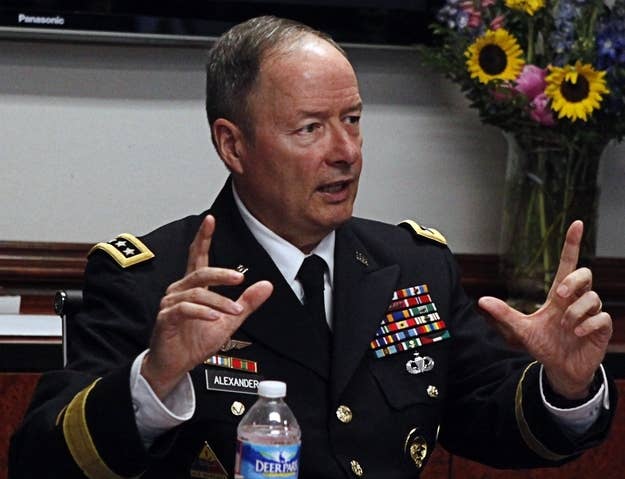
Last night's Guardian report revealing a secret NSA court order requiring Verizon to hand over call data is no doubt a bombshell. Yet as vindicating as these documents may be for government transparency activists, this type of NSA surveillance is far from breaking news — it dates back to at least 2005.
In December of that year, The New York Times reported that the Bush administration secretly authorized the NSA to pore over phone calls and emails of thousands of U.S. citizens in an effort to uncover terrorist activity. The report triggered an investigation and series of lawsuits from the Electronic Frontier Foundation (EFF).
"Basically this confirms everything we've been saying for years," EFF activist Trevor Timm told BuzzFeed. "Obviously in 2005 when the Times broke the NSA wiretapping story, it made national headlines and there were investigations and hearings." So what changed? On the NSA's side, not much: "It's not that the NSA surveillance programs stopped," he says, "it's just that people stopped caring about it."
@joshuafoust I still don't see how the Greenwald piece is news. See https://t.co/PDbeXHmBZb

STEPHEN DORFMAN
@21law
@joshuafoust I still don't see how the Greenwald piece is news. See https://t.co/PDbeXHmBZb
@joshuafoust @21law I work at EFF. Confirms everything we've been saying in court. Impossible to express in 140 char how important that is.
Trevor Timm
@trevortimm
@joshuafoust @21law I work at EFF. Confirms everything we've been saying in court. Impossible to express in 140 char how important that is.
There was plenty more reporting: Take this story from May 2006 in USA Today, which reported the NSA as having the goal of "creat[ing] a database of every call ever made." Similarly, the EFF published documents from an AT&T whistle-blower and former technician that show a secret NSA-controlled room inside an AT&T San Francisco headquarters used to siphon communications from AT&T customers to the government agency. The documents made news, but they quickly faded into the background.
And as recently as two weeks ago, NSA Director General Keith Alexander told Reuters, "The great irony is we're the only ones not spying on the American people." That story, too, barely broke through the news cycle.
Activists like Timm are optimistic, however, that the presence of obtained government documents will keep this story in the public eye.
"I certainly hope this is going to blow the doors open," he said. "There's a great analogy here with CIA's drone program. It's been on the front pages of papers, and they wouldn't confirm or deny for years, and Congress refused to pay attention. But when the white paper came out and documents were leaked to NBC, Congress was able to open up the oversight and transparency conversation to a degree."
The impact of a smoking gun, though, depends on two things, neither of which seem to favor Timm's outlook: that people care about the issue that's being exposed, and that they're genuinely surprised by the disclosure. Among people who aren't actively engaged with issues of privacy and data protection — that is to say, a large majority — there's a widely held assumption that yes, of course the government has access to our phone records. These documents prove the most banal thesis about how the government is wronging its citizens; to reveal definitively that the government has our phone records is to confirm something that many people don't just already believe, but have given up caring about.
"Obviously when the American people signed up for the Patriot Act, they didn't think it would be used against every single one of them," says Timm. When they quickly found out that it would, however, the response was flat.
Consider the resilience of 9/11 conspiracy theories, which, based on extremely thin and often false or mistaken evidence, distracted and impassioned millions of Americans for the better part of the last decade. During that same time, an unprecedented expansion of the surveillance state actually took place, leaving behind a trail of evidence that would have easily boosted a lesser but more sensational scandal past the threshold of public outrage — but not the destruction of privacy; last night's news is just one more confirmation of what Americans have already resigned themselves to living with.


